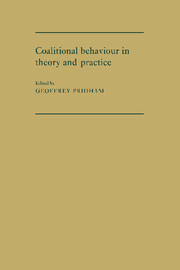Book contents
- Frontmatter
- Contents
- List of illustrations
- List of tables
- Notes on the contributors
- Preface
- 1 An inductive theoretical framework for coalitional behaviour: political parties in multi-dimensional perspective in Western Europe
- 2 Between theoretical elegance and political reality: deductive models and cabinet coalitions in Europe
- 3 Changing coalitional preferences among West German parties
- 4 The FDP and coalitional behaviour in the Federal Republic of Germany: multi-dimensional perspectives on the role of a pivotal party
- 5 Cabinet stability in the French Fourth Republic: the Ramadier coalition government of 1947
- 6 Coalition formation and maintenance in Belgium: a case-study of elite behaviour and changing cleavage structure, 1965–1981
- 7 The Dutch Christian Democratic party and coalitional behaviour in the Netherlands: a pivotal party in the face of depillarisation
- 8 Coalition or Fianna Fail? The politics of inter-party government in Ireland
- 9 Italy's party democracy and coalitional behaviour: a case-study in multi-dimensionality
- 10 Party coalitions in the first democratic period in Spain, 1977–1982
- 11 Coalitional theory and practice in Scandinavia
- 12 Multi-dimensional approaches to the study of local coalitions: some cross-national comparisons
- 13 Research notes
- Index
10 - Party coalitions in the first democratic period in Spain, 1977–1982
Published online by Cambridge University Press: 05 November 2011
- Frontmatter
- Contents
- List of illustrations
- List of tables
- Notes on the contributors
- Preface
- 1 An inductive theoretical framework for coalitional behaviour: political parties in multi-dimensional perspective in Western Europe
- 2 Between theoretical elegance and political reality: deductive models and cabinet coalitions in Europe
- 3 Changing coalitional preferences among West German parties
- 4 The FDP and coalitional behaviour in the Federal Republic of Germany: multi-dimensional perspectives on the role of a pivotal party
- 5 Cabinet stability in the French Fourth Republic: the Ramadier coalition government of 1947
- 6 Coalition formation and maintenance in Belgium: a case-study of elite behaviour and changing cleavage structure, 1965–1981
- 7 The Dutch Christian Democratic party and coalitional behaviour in the Netherlands: a pivotal party in the face of depillarisation
- 8 Coalition or Fianna Fail? The politics of inter-party government in Ireland
- 9 Italy's party democracy and coalitional behaviour: a case-study in multi-dimensionality
- 10 Party coalitions in the first democratic period in Spain, 1977–1982
- 11 Coalitional theory and practice in Scandinavia
- 12 Multi-dimensional approaches to the study of local coalitions: some cross-national comparisons
- 13 Research notes
- Index
Summary
The neglect of coalition studies in Spain
In 1977, after a dictatorship of some forty years, Spain agreed to a democratic system. The passing of a system based on the denial of liberties and competitive elections to another dominated by political parties and electoral results was, as is well known, peaceful, having been attained by means of a pact between reformist groups of the Franco regime and the parties of the democratic opposition.
Immediately following the elections of 15 June 1977, the Cortes proceeded to work on the Constitution in a climate of general consensus; at the same time, the main parties signed the so-called Moncloa Pact of 1977, which was of a political, social and economic nature. Simultaneously, the problems related to autonomy began to resolve themselves with the adoption of devolutionary measures negotiated between the government and nationalist or regionalist groups.
Thus, the idea of a pact, negotiation, agreement, consensus, etc. came to form the substratum upon which the Spanish constitutional system has been built, and caught the immediate attention of all political observers, who were surprised at the breadth of this policy of collaboration between parties and social forces of widely differing tendencies.
However, although every study has indicated the importance of this policy to the consolidation of the democratic system, the subject of cross-party alliances has been studied only in an indirect and practically marginal way in the context of studies on the party system.
- Type
- Chapter
- Information
- Coalitional Behaviour in Theory and PracticeAn Inductive Model for Western Europe, pp. 232 - 250Publisher: Cambridge University PressPrint publication year: 1986



